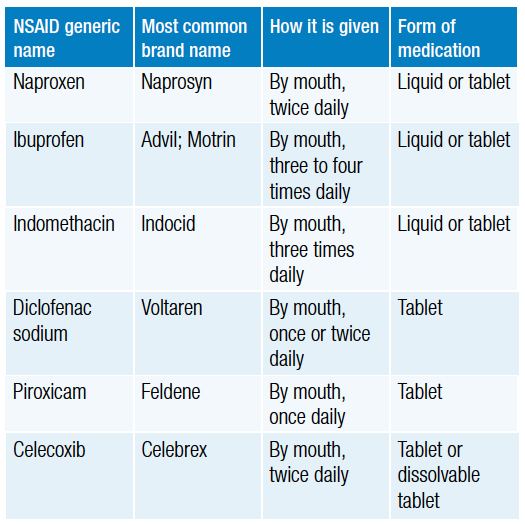Non-Steroidal Anti-Inflammatory Drugs (NSAIDs) – (children)
What is it?
Non steroidal anti-inflammatory drugs (NSAIDs) (brand names: Brufen, Naprosyn, Voltaren, Celebrex, Naprogesic) are medicines commonly used to treat painful swollen joints. They are not steroids but are effective in reducing pain and stiffness. These medicines are often used when your child is initially diagnosed with arthritis because they quickly control the pain and inflammation. However, usually other drugs need to be added over time in order to further improve your child’s condition.
How will it help?
NSAIDs stop cells making prostaglandins. Prostaglandins are chemicals released by cells. High levels may cause inflammation and swelling and increase pain. NSAIDs work very quickly and are often usually the first medicine used to treat inflammation.
How are NSAIDS given?
They are given as a liquid or tablet. NSAIDs should always be taken with food. This can make it easier on the stomach.

What is the dose, and how often is it given?
The dose is calculated on your child’s body weight. How long will it be used for? The NSAIDS may be used while your child has ongoing pain.
Are there any side effects?
NSAIDs usually helps your child’s disease but, as with all medicines, side effects can occur. Some are common, and some are rare. Most young people don’t have any problems when they take NSAIDs.

Things you need to know when taking this medicine
These drugs come in many forms. Please ask your doctor or pharmacist for more specific information.
What to do if your child is sick
If an additional medication is needed for pain or fever, give paracetamol (Panadol). Do not give another NSAID like ibuprofen (e.g. Nurofen), which may be included in cold and flu remedies. This would result in taking too much anti-inflammatory medication.
Interactions
Many drugs used to control inflammation have a common side effect of stomach upset. Taking combinations of these drugs (more than one NSAID) can increase the possibility of this happening.
Immunisations
All immunisations can be safely given as per the normal immunisation schedule, when on NSAIDs.
Infections
There is no added risk of infection.
Myths and misconceptions
You may hear a lot of different information about NSAIDs from friends, pharmacists or people you know. If you are worried about anything, please talk to your child’s doctor or nurse. If your child is taking NSAIDs they should see their paediatric rheumatologist regularly to make sure the treatment is working and to minimise any possible side effects.
Important things you should remember
- You must see your rheumatologist regularly to make sure the treatment is working and check for possible side effects.
- You should have regular blood tests as suggested by your rheumatologist.
- If you are worried about any side effects, you should contact your rheumatologist as soon as possible.
- If you stop NSAIDs for any reason, you must contact your rheumatologist.
This medicine should be kept in a safe place, as accidental overdose can be serious.
For further information please see NSAID printable information sheet_ Paediatric
This Information Sheet has been prepared using materials obtained from various sources which have been reviewed by the Australian Rheumatology Association (ARA). It contains general information only and does not contain a complete or definitive statement of all possible uses, actions, precautions, side effects or interactions of the medicines referenced. This information is not intended as medical advice for individual conditions nor for making an individual assessment of the risks and benefits of taking a particular medicine. Decisions regarding the assessment and treatment of patients are the sole responsibility of the treating medical professional, exercising their own clinical judgment and taking into account all of the circumstances and the medical history of the individual patient. ARA has used all reasonable endeavours to ensure the information on which this Information Sheet is based is accurate and up to date. However, the ARA accepts no responsibility or liability for the accuracy, currency, reliability and/or completeness of the information contained in this Information Sheet. To the maximum extent permitted by law, the ARA expressly disclaims any liability for any injury, loss, harm or damage arising from or in connection with use of and reliance on the information contained in this Information Sheet. This information sheet is copyright and may be reproduced in its entirety but may not be altered without prior written permission from the ARA. Page updated April 2024Discover more...
-
10 steps for living well with arthritis
Here is our 10 steps checklist to help you live with arthritis.
-
Programs & Research
Arthritis Australia funds research and advocates to improve care, management, support and quality-of-life for people with arthritis.
-
Advocacy & policy
Arthritis Australia advocates to government, business, industry and community leaders to improve care, management, support and quality of life for people with arthritis..
Sign up to Arthritis Insights
Regular updates, news and research findings delivered to your inbox: